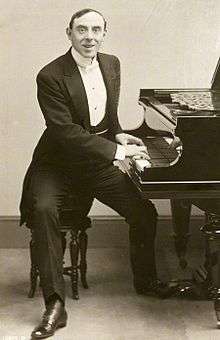Harry Fragson
Harry Fragson (2 July 1869 – 31 December 1913), born Léon Philippe Pot, was a British music hall singer and comedian, born in Soho, London. Having scored a number of successful performances in England, Fragson moved to Paris, where he developed an act imitating French music hall performers. The act was popular, and allowed him to introduce his own material. He returned to London in 1905 and became a popular in pantomime. He is perhaps best known for his song "Hello, Hello, Who's Your Lady Friend?" which he recorded shortly before his untimely death in 1913 (he was murdered by his father).

Biography
Fragson was born Leon Philippe Pot at 4 Old Compton Street, Soho, London. He was the son of the hotelier Victor Pot and his wife Léontine Pot née Winand. In 1871, the family moved to 42 Greek Street, Soho. In the early months of 1912, Fragson made the first of two appearances at the Kings Theatre in Scotland, having just been released from his engagement at the Alhambra theatre in Paris.[1] He returned to make his final appearance on 15 October 1913, before returning to France.[2]
On 31 December 1913, while living at 56 rue Lafayette in Paris, Fragson returned home to discover his mentally ill father Victor Pot was just about to commit suicide.[3] An argument ensued as Pot suspected his son was having an affair with his mistress Paulette Franck.[4] Pot then fatally shot his son.[5] His father died 6 weeks later[6] in an asylum.[7] Fragson is buried at le Père-Lachaise cemetery in Paris.[8] More than 50,000 people followed his hearse to Saint Augustin church.[9]
Legacy
Fragson was perhaps best known as a popular pre-World War I entertainer and introduced hundreds of songs, including "Reviens", "Si Tu Veux...Marguerite", "A La Martinique", "La Baya", "Les Blondes", "les Jaloux", "Amours Fragiles" and "Les Amis De Monsieur". He had an Irving Berlin song, "A Girl In Havana", adapted to "Je Connais Une Blonde" which was popular among World War I soldiers. At the time of his death, Fragson left £80,000 in his will.[10][11]
References
- "Harry Fragson At The King's Theatre", Dundee Courier, 12 April 1912, p. 7
- "Harry Fragson At The Kings Theatre", Dundee Courier, 17 October 1913, p. 7
- "Harry Fragson The Comedian", Dundee Courier, 31 December 1913, p. 5
- Baker, Anne, Pimlott. "Delysia, Alice (1889–1979)", Oxford Dictionary of National Biography, Oxford University Press, 2004, online edition, January 2011, accessed 10 April 2013 Oxford Dictionary of National Biography (online ed.). Oxford University Press. Missing or empty
|title=(help) (Subscription or UK public library membership required.) - New York Times archives PDF "MUSIC HALL STAR KILLED BY FATHER", New York Times,
- Mr Fragson's Father Is Dead", Western Gazette, 20 February 1914, p. 12
- "Harry Fragson's Father", Coventry Evening Telegraph, 16 February 1914, p. 3
- "Funeral Of Harry Fragson", Newcastle Journal, 5 January 1914, p. 10
- "The Shooting Of Harry Fragson", Manchester Evening News, 28 January 1914, p. 2
- "Harry Fragson's Will, The Sydney Morning Herald, 5 January 1914, p. 10
- "Harry Fragson's Fortune", Manchester Evening News, 18 February 1914, p. 2
External links
- Free scores by Harry Fragson in the Choral Public Domain Library (ChoralWiki)
- Harry Fragson biography French variation.